Platinum Group’s Dale Kurschner produces a CEO interview program called “One Take” – a continuous, unscripted dialogue with no edits, usually recorded from each CEO’s home via Zoom. In each 10- to 20-minute interview, Dale asks one CEO to provide his or her take on how best to deal with the most pressing business and economic issues of the day.
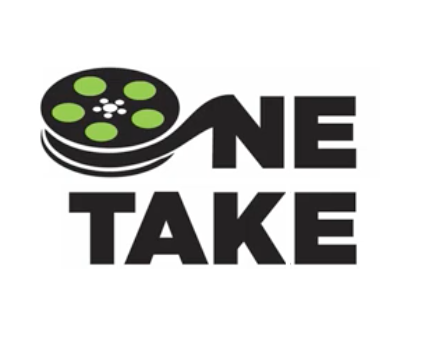
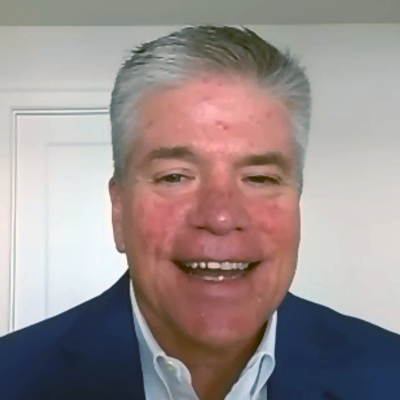
Jeff Kiesel
Jeff Kiesel, CEO of Restaurant Technologies Inc.
During this unrehearsed, unedited interview, Restaurant Technologies Inc. (RTI) CEO Jeff Kiesel shares how his business overcame significant COVID-19-related challenges and along the way, improved its go-to-market strategy and how it takes care of its 10 largest clients. It also consolidated/simplified its IT systems and centralized administrative work. When COVID first affected RTI’s business, it furloughed 250 people. All but 7 have since returned to work (five retired), plus another 350 have been hired during 2021 and dozens more a month are expected to be added through December.
RTI delivers new and recovers used cooking oil for more than 30,000 restaurants as well as food service providers serving commercial and non-commercial customers. It is based in Mendota Heights, Minn., and operates through 40 depots located across most of the country. It also provides fry cook hood cleaning systems and services, a niche it began covering about four years ago. MORE
Watch the interview here on YouTube, or downloaded/listen to it here via Spotify.
For those wanting to jump to a specific question and answer, see the segment links below:
- 00:33 Since we last talked one year ago, how did things go relative to what you were planning then, how many people were furloughed and what surprises came up?
- 02:44 [Prior answer mentioned the importance of internal communication] How did you communicate during COVID with employees at your depots who are typically out in the field all day and are only on site briefly when coming and going?
- 04:18 What is your retention rate?
- 04:33 How are you doing with attracting talent and how many positions do you have open?
- 05:33 How did you change your sales approach, and how have your sales teams adjusted?
- 06:58 In what areas did you centralize parts of your business, and in what other areas did you enhance verticals?
- 08:35 In instances where a major client has a dedicated sales team or lead acting as a chief client officer, how do things work when a matter needs to be transferred over to centralized services?
- 10:51 How have these changes improved your pipeline, closes, engagement and other ways of tracking sales and customer service?
- 11:57 Any potential acquisitions you can tell us about?
- 12:26 How much did your employment levels drop during COVID, how much have they bounced back and how many people are you looking to hire by year’s end?
- 12:46 How are you dealing with the challenge of bringing people back to the office?
- 13:54 How has collaboration changed at RTI following COVID?
- 14:19 How did you deal with the polarization around face masks, and how are you now dealing with whether employees should be vaccinated to work?
- 16:18 Through COVID and everything else during the last 18 months, what if anything would you like to have thought of earlier than you did?
- 17:32 What went well that you are most proud of?
- 18:19 How did you go about consolidating software and other IT tools or services used by your employees?
- 21:05 What is the one platform you chose to help achieve this?
- 21:54 How have you dealt with all these challenges and changes personally; how have you made sure to stay healthy both physically and mentally?
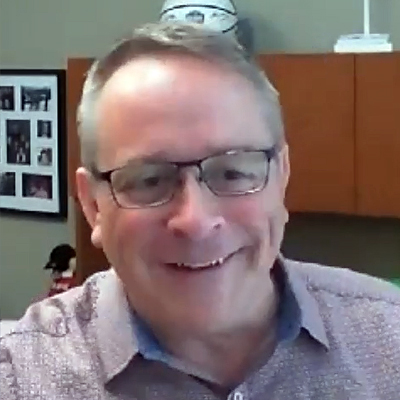
Doug Jaeger
Doug Jaeger on Buying a Canadian Company During a Pandemic, Employing Talent Where it Lives & More
Jaeger's company Ulteig recently acquired a Canadian business without visiting it due to COVID-19 travel restrictions. This after Ulteig grew 20 percent a year for five consecutive years and expanded from 300 to 700 employees.
One of several fascinating takeaways from this interview is how Jaeger maintains a healthy corporate culture regardless of where employees may now be working. He also plans to locate collaboration centers or small offices where the best talent can be found, rather than requiring talent to move to an existing Ulteig office. And he says, what his company achieved during the last 12 months proves, “you don’t need to set your strategy aside when the world around you changes dramatically.”
Ulteig provides engineering services primarily in the life line sectors of power, renewables, transportation and water. It recently acquired NLS Engineering, a firm widely recognized as one of the most experienced integrators in the North American energy and water sectors.
Watch the interview here on YouTube, or downloaded/listen to it here via Spotify.
For those wanting to jump to a specific question and answer, see the segment links below:
- 01:00 What does Ulteig do and how big was it before the recent acquisition?
- 02:27 How did COVID-19 affect your business and that of your clients, and how did you adapt?
- 04:23 How did Ulteig continue serving clients when it could no longer send a team roughly 30 people to a site to review how engineering plans were being implemented?
- 05:55 How the use of smartglasses can help be present virtually in other instances
- 06:37 How much will making actual site visits and having employees working in the office revert back to how it was?
- 09:25 How will you be changing your offices and collaboration spaces?
- 11:22 How do you recruit differently today given?
- 13:23 Why not continue to recruit primarily around your main offices in Denver, Fargo and Minneapolis?
- 14:34 What has been your greatest challenge since March 2020?
- 17:17 How does Ulteig address the issues of diversity and inclusion?
- 19:30 Any question that should have been asked but wasn’t?
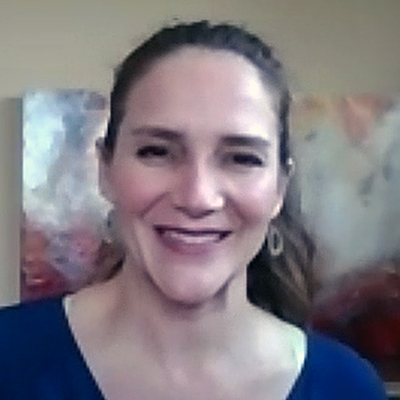
Christine Lantinen
CEO Christine Lantinen on how Maud Borup Grew Sales 50 percent While Fighting a Pandemic
One year after her first One Take interview, Christine Lantinen returns to discuss how Maud Borup weathered the pandemic; how its attracting and retaining talent both in the Twin Cities and Le Center, Minn.; why it's looking to expand capacity yet again after just adding 70,000 square feet last year; whether employees are required to work at the corporate office; and more.
Lantinen is owner and CEO of Maud Borup, a candy and gourmet foods maker with nearly 40 million dollars in annual sales, which is up almost 50 percent from a year ago, and more than 200 employees, double from a year ago. The company sells to specialty and mass retailers such as Walmart and Target, and has licensing agreements to make food items for large global brands such as Hell's Kitchen. Maud Borup develops more than 150 products each year and each item can be customized to fit what each client would like. During 2020, the company cornered the U.S. market for hot cocoa bombs.
Lantinen’s interview can be listened to via Spotify or watched here on YouTube. For those wanting to jump to a specific question and answer, see the segment links below:
- 01:50 (Skip intro.) We talked one year ago at this time (May 2020) about how you were going to deal with the pandemic. How did it go?
- 02:55 How much were your margins affected, and why?
- 03:50 Did you increase pay for your second shift by $5 an hour?
- 04:21 Beyond wage increases, what are you doing to attract and retain talent?
- 05:35 Any chance piece-rate or mini-shifts could help?
- 06:49 Any thoughts about offering daycare or some other service for employees at your main production facility?
- 07:36 How pursuing B corporation status help with recruitment and retention?
- 08:36 What a certified B corporation is.
- 09:07 A year ago you required people to keep coming to work. As society has since adopted more of a work remotely at least sometimes attitude, what is your policy?
- 11:33 Tell us more about the family aspect of your family business.
- 15:34 In the midst of intense economic and social uncertainty one year ago, you were still going 100 percent toward a major expansion. How did that go and where are you at with capacity today?
- 17:49 In the past year attention has focused more toward diversity and inclusion in the workplace. How does Maud Borup deal with this issue? How have you cornered the market on cocoa bombs and what’s next for this product line?
- 23:00 Are you already looking to expand our production capacity yet again?
- 24:28 What's your biggest challenge as you look at the next 12 months to 24 months
- 26:14 What’s meant when saying new hires need to “geek out at being challenged every day.”
Click here to watch Lantinen's first One Take CEO Interview.
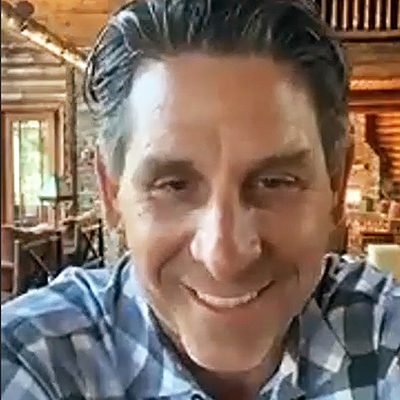
Chuck Runyon
CEO Chuck Runyon on How Self Esteem Brands Made its Largest Acquisition in History While Fighting a Pandemic
Self Esteem Brands (SEB) recently completed its largest acquisition in history despite all the challenges and uncertainty brought on by COVID-19. One year after his first One Take interview, co-founder and CEO Chuck Runyon returns for a “Take Two” to share how and why the acquisition was able to happen. He also discusses how his company helped franchisees since the pandemic began (and looming cost increases once rent abatements or deferrals end); the introduction of a bill to provide financial relief to the gym and fitness industry (the Gyms Act); whether employees will be coming back to work full time at the company’s headquarters; and why the nation needs to focus more on physical and mental health.
SEB is a global collection of health improvement and fitness-related companies including Anytime Fitness, The Bar Method, Base Camp, Wax the City and as of this June, Stronger U, a digital, personalized nutrition-based health coaching services brand. SEB was founded in 2002 and for several consecutive years ranked as the world’s fastest growing franchise. Today it serves millions of people in 40 countries.
Runyon’s interview can be listened to via Spotify or watched here on YouTube. For those wanting to jump to a specific question and answer, see the segment links below:
- 01:11 Skip intro. What hybrid-work is like for Runyon and his employees.
- 02:26 Will employees be required to come back to the office and if so, how many days of the week?
- 03:04 How the pandemic affected customers and franchisees, and how SEB serves them.
- 05:17 How SEB headquarters employees in the Twin Cities helped Franchisees with hyper-local challenges this past year.
- 06:59 The three priorities SEB focused on since the pandemic started.
- 08:23 What can be done to help franchisees cover increased rent costs once abatements or deferrals end? And what is the Gyms Act?
- 10:21 How does buying another company, Stronger U, fit into all of this?
- 11:39 How many franchisees did SEB lose during the pandemic?
- 12:48 How was SEB affected financially due to the pandemic?
- 14:06 How was SEB able to make its largest acquisition while working through all the operational and financial challenges caused by COVID-19?
- 14:59 How much of this was possible because of the investors you have backing SEB?
- 15:52 Why health care needs to be thought of as an essential service.
- 17:20 What’s the healthiest country, and how do we compare?
- 18:50 What’s your greatest challenge heading into 2022?
- 20:02 When will Stronger U products and services be available at Anytime Fitness locations? 20:41 How leaders focused on the wrong side of the issue this past year: sickness rather than healthiness, and why this needs to change.
- 21:49 Are we in an unhealthiness pandemic, or nearing one?
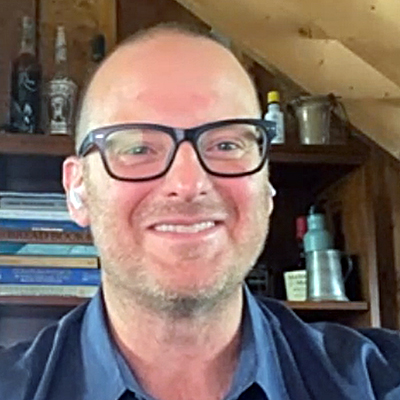
Nick Elders
Nick is CEO of Ignify Technologies, an early stage fintech company whose SPARK loan origination platform facilitated 50,000 SBA loans worth $7 billion in two weeks last year. Those loans in turn helped save 500,000 jobs. During this One Take CEO Interview presented by Platinum Group, he explains how the company quickly scaled up to meet demand, how it plans to grow and how it does well attracting and retaining talent—something its top three leaders spend 30-40 percent of their time doing. Ignify is a public benefit corporation (PBC) spun out from Minneapolis-based Community Reinvestment Fund USA in 2020. Ignify/SPARK is the nation’s only SBA loan origination PBC.
Elder’s interview can be listened to via Spotify or watched here on YouTube. For those wanting to jump to a specific question and answer, see the segment links below:
- 00:51 What’s unique about this fintech concept?
- 02:26 How did you process 50,000 loans worth $7 billion within the first two and a half months of the PPP last year?
- 06:12 Are you worried at all about getting to a point where you're so big you're not that nimble anymore?
- 07:54 How are you going about hiring the right people so that you remain nimble and continue to evolve the way you want to, but get much larger as an organization?
- 09:26 How—and how often—do you assess how each employee is doing, where he or she wants to be at the company, what is their perfect role, what may be getting in their way, etc.?
- 10:28 What do you call your periodic check in with employees if not “reviews?”
- 11:07 Tell us more about the concept of “buying back time” when hiring others.
- 11:55 What percentage of your time is focused on talent versus on technology?
- 12:41 How are you finding the right talent, and how much of it must work in the office or can work anywhere in the world?
- 14:30 What about collaboration and innovation that can only come about by casual in-person meetings?
- 15:55 How have you shifted gears from all the PPP activity last year to what your business model was originally, and how to grow from here?
- 17:40 You mentioned last year’s work was able to help save 500,000 jobs. How does this reflect on the fact you are a mission-driven public benefit corporation (PBC)—the only SBA loan origination PBC—and why are you a PBC?
- 20:30 When did you launch SPARK and its parent company?
- 22:25 How many years, at your present cash-burn rate, does last year’s spike in business fund before you might need to raise capital?
- 23:50 What’s the barrier to entry from others doing exactly what you're doing?
- 25:03 What are your annual revenues?
- 27:04 You received a great financial shot in the arm last year with all the PPP-related lending activity. As you now spend to scale up, how are you going to maintain a healthy operating profit margin and high quality?
- 27:46 Anything else that I should have asked you today that we didn't get to?
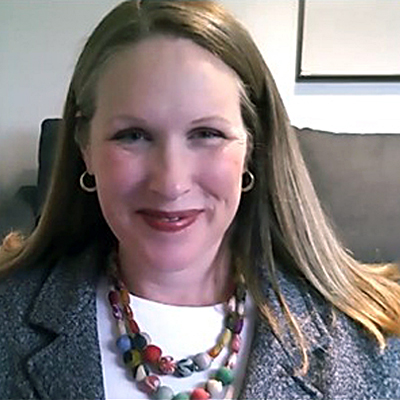
Leslie Holman
In this episode of One Take CEO Interviews presented by Platinum Group, Leslie Holman, owner and CEO of Pinnacle Performance Group, discusses how her firm helps fill the gap that can often exist between front line employees and senior leadership, and how COVID-19 has helped narrow this gap.
In companies of all sizes, she says, “there is that common thread that success is bred through employees at all levels, and it's often that front line employee who has not been heard or listened to, or often sadly, not respected enough when it comes to how critically important they are in the success of the organization.”
Holman explains ways to identify such gaps and more importantly, how to translate or explain those findings to senior leadership. She also addresses other topics including how the healthy work/life balance and culture at her company helped it weather all of the challenges that have come up since the COVID-19 first flared up in March 2020.
Holman’s interview can be listened to via Spotify or watched on YouTube. For those wanting to jump to a specific question and answer, see the links below:
- 01:27 Given your engineering degree and background working for Ford Motor Co. and McKinsey & Co, why eight years ago did you buy a training firm that specialized in helping the restaurant industry?
- 03:02 How do you convince a business owner or leader that front line employees are thinking and feeling quite differently on important issues than what leadership believes they are?
- 04:27 How do you identify the gaps that matter most between the front line and the board room?
- 05:42 How has COVID-19 affected the relationship between the board, owners and leaders, and the front line employee?
- 07:34 What is your company’s culture like, and what has been different for you as a leader these past 12 months?
- 08:52 How have you kept your employees energized, focused and constructive despite the pandemic, social unrest, politics and other stressful issues?
- 11:30 What challenge last year meant more to you than others in terms of how you solved it?
- 14:07 What is your greatest challenge now?
- 14:57 What question should I have asked that I didn’t?
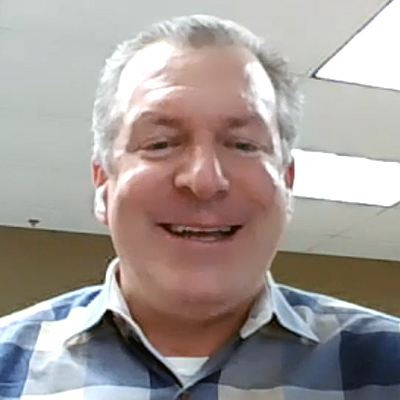
Chuck Tryon
Owatonna, Minn.-based Bushel Boy is well known in Minnesota for first perfecting indoor grown, vine-ripened tomatoes available in local grocery stores year-round 41 years ago. Competition has increased rapidly in recent years, leading the company to both expand production and explore other crops to produce indoors, beginning with strawberries.
Chuck Tryon was hired as Bushel Boy’s president last October to expand upon these efforts. In this One Take CEO Interview (watch here), he explains how he plans to do this, and how he addressed COVID-19-related challenges including potential delays on the company’s $35 million, 50-acre expansion project in Mason City, Iowa. Key to Bushel Boy’s future success, he says, will be doing better at finding and retaining talent. (Tryon’s interview is also available as a podcast on seven audio platforms including Spotify and Apple Podcasts.)
Bushel Boy employs about 100 people in Owatonna and 50 in Mason City, where the recent expansion is expected to increase production by 50 percent and allow the company to maintain a more consistent crop of tomatoes during the year. Bushel Boy also recently completed a 4.5-acre research and development greenhouse in Owatonna. While strawberries are being tested today, other crops to be experimented with for possible indoor growing include cucumbers and peppers.
Innovation is a must and includes a vigilant focus on producing the best quality product, Tryon says. While Bushel Boy was an early leader in this niche, the square footage of indoor agriculture for tomatoes nationwide increased 45 percent between 2007 and 2017. Just within the last five years in Minnesota, indoor tomato square footage increased 43 percent, according to the Star Tribune.
Bushel Boy was acquired in 2018 by Shakopee, Minn.-based Rahr Corp., which is best known for its malting business.
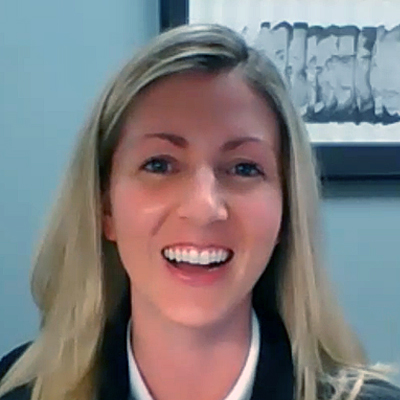
Claire Ferrara
One of the most challenging aspects of the COVID-19 pandemic as it hit last year was how to continue servicing residential heating and air conditioning systems. How could shelter in place, work from home and remote learning all remain safe with an outsider coming into the house? And how could a repair person be assured he or she wouldn’t catch COVID while in someone’s home?
These were only a few of the challenges needing to be addressed by Claire Ferrara, president and majority owner of Minneapolis-based Standard Heating and Air Conditioning, a fourth-generation family-owned business employing about 100 people. “We're in the heating and air conditioning business but we're really in the people business and it's very much about a person-to-person interaction,” she says.
Making matters even more challenging: Ferrara took over leading the business only one month earlier.
In this episode of One Take CEO Interviews, she shares how she dealt with those and other challenges, both professionally and personally. Below are chapters one can jump to, and here are a few excerpts:
“One thing that got us through the whole year was the level of transparency and constant communications that we had. We started by convening employees from every department and said, ‘okay how do we make this work; what's going to make you feel safe?’ That was the first step, making people feel heard and part of the process. The other part was they knew I had their back. I made it very clear up front if anyone is ever uncomfortable or feels unsafe, just like if they did outside a pandemic, you do not have to go into a home or do whatever the task is in front of you.”
“The customer did go away for a while. If you had asked me the first couple of weeks of April [2020] I would have said, gosh by the end of the year, my business needs to be half the size it is today.” Everyone working from home, however, led to a surge in business and the challenges of meeting it both with staffing and with equipment and supplies.
“Leadership can feel thankless sometimes, but you have to find the good and the motivation in all the little moments and there have been so many, like the technician who suddenly pulls you aside and to say ‘‘hey, how are you doing?’ or to say ‘thank you for that.’”
The interview can be listened to via Spotify or Apple Podcasts or watched on YouTube. Subjects Ferrara covers are indexed below allowing one to jump straight to it:
- 01:10 Quickly dealing with COVID-19 as work-from-home became mandated
- 03:30 Helping employees feel safe working in peoples’ homes even while COVID was spreading rapidly
- 05:00 Countering misinformation
- 07:36 Dealing with potential delays in receiving supplies and equipment
- 08:42 The greatest challenge she faced last year
- 10:35 Personally dealing with all the stress last year created
- 12:10 What’s in store for the company the rest of this year and into next
- 14:12 Greatest challenge now
- 15:47 Regarding lists of the top three things one can do to lead during a crisis
- 16:44 The importance of recharging one’s batteries, or sense of self
- 18:43 How to deal with those times when leadership can feel lonely
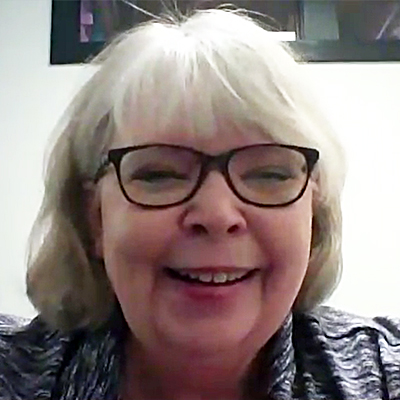
Betsy Niemeier
In this week’s One Take CEO Interview, Co-Owner and President of M&N Structures Betsy Niemeier shares how she has dealt with all the challenges thrown her way recently, including COVID-19, another surge in steel prices, delays in vendor delivery time and political polarization in the workplace. You can watch this interview (and select specific chapters to jump to) via this YouTube link. You can listen online or download and listen to it later through these Spotify or Apple Podcast links.
Individual portions of the interview can be watched by clicking on the following times:
- 00:56 How M & N Structures is unique in the marketplace; it’s not just steel fabrication
- 2:55 M & N’s size; annual sales, number of employees and shop size
- 3:25 How steel prices have affected the business over the years, and currently
- 7:29 How are you dealing with delays in vendor shipments of materials you need to be meet your customers’ schedules.
- 08:50 Are these kinds of delays more anticipated, or are they happening now?
- 09:55 How Covid-19 affected the business last year and is still affecting it today
- 15:13 How have you been able to communicate as effectively and quickly as you have needed to?
- 18:52 What are some of your key takeaways from 2020?
- 22:15 How do you stay fired up, how do you stay positive, you have a lot of pressures on your shoulders right now—family health issues, all the things you just shared with us...
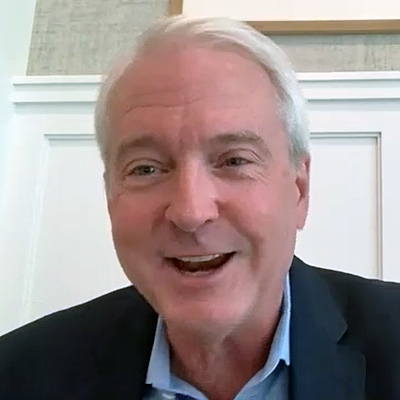
Ben Fowke
In this One Take CEO Interview, Xcel Energy Chairman and CEO Ben Fowke talks about a wide range of issues including how the utility is investing so much in carbon-free energy production while keeping rates comparable or lower than its peers.
With about half of his workforce working remotely, Fowke shares what he’s doing to keep morale up and accelerate innovation even when people cannot collaborate together. He also discusses how the company is addressing racial issues elevated by George Floyd’s death, the sense amongst many that downtown Minneapolis is no longer a safe place to work, and his greatest challenge this year.
The entire interview, or individual questions and answers, can be watched in this YouTube video. It can be heard in its entirety on Spotify or Apple Podcasts.
Individual questions and answers are...
- 01:20 How COVID-19 affected energy use and as a result, Xcel’s operations and financial results
- 02:47 Innovation he is most proud of in 2020
- 03:59 How employees are still collaborating as well as they did while previously working together in person
- 06:18 What’s being done to keep up employee morale
- 07:59 What’s being done to ensure Xcel is safe from hacks and other cyber attacks
- 09:56 How Xcel dealt with the racial issues George Floyd’s death helped elevate
- 12:21 Addressing the need to have more people of color added to the talent pipeline
- 14:00 Dealing with the sense among downtown workers that it’s not safe to go to and from work
- 15:18 Whether Xcel Energy can expedite its plans to be carbon-free by 2050 to instead do so by 2035 as the Biden Administration says it wants all utilities to achieve
- 17:26 His greatest challenge in 2021
- 18:32 How Xcel is able to invest heavily in carbon-free energy initiatives while keeping its utility rates as low or lower than utilities that are not investing as much, if any, toward clean energy
- 19:52 Succession planning
- 20:47 How Xcel Energy is supporting the community in other ways, including donating $20 million last year toward COVID-19 and racial justice initiatives.
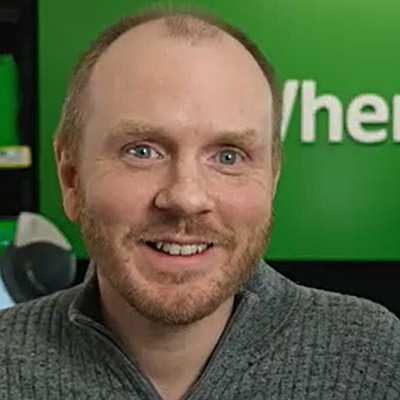
Chad Halvorson
Imagine having about half of your revenues tied to serving the restaurant and hospitality industries last year... How would you have dealt with COVID-19-related temporary closures and ongoing restrictions in those industries, the plunge in their revenues and the potential harm to yours?
Chad Halvorson and his leadership team had to deal with that challenge, and more, during 2020 and he talks about it all in this week’s One Take CEO Interview. [Note: These interviews now have chapters, allowing one to tune into one or two subjects if there isn’t enough time to catch the entire interview.]
Halvorson is founder, chairman and chief experience officer of the Minneapolis-based HR-technology firm When I Work. His 10-year-old business provides a unique employee engagement-focused scheduling, time tracking and messaging solution ensuring reliable staffing coverage and faster decisions amongst more than one million hourly employees at 150,000 workplaces across the United States. Annual revenue is “in the tens of millions” and headcount is expected to grow from 130 to 200 by the end of the year, he says. The company has conducted two rounds of financing totaling $25 million, with the most recent a $15 million raise in 2016.
In his interview, Halvorson explains how his business managed to end 2020 strong financially, the greatest challenge he overcame last year, and the greatest challenge he anticipates in 2021. The entire interview can be watched in this YouTube video or listened to through these Spotify or Apple Podcast links. To go directly to specific parts of this interview, see the subjects and corresponding links below.
- 12:09 Greatest challenge in 2020
- 13:21 First reactions to when COVID-19-related shutdowns affected business
- 04:58 How When I Work responded to COVID-19’s impact on its business last year
- 01:09 How COVID-19’s impact on the hospitality and restaurant industries affected When I Work
- 08:34 How diversification is helping the business during the COVID-19 economy
- 09:57 Which industry sectors When I Work is planning to expand the most quickly, and why
- 15:50 What it was like transitioning the CEO position to another individual while COVID-19 was hitting
- 19:18 Greatest challenge for 2021
- 21:01 When I Work’s unique value proposition
- 23:54 Growth plans
- 25:10 Talent sought/help wanted
- 05:59 How When I Work uses artificial intelligence in its HR tools
- 07:30 What sorts of intelligence When I Work provides to employers
- 22:38 Tracking employees vs. tracking their checking in
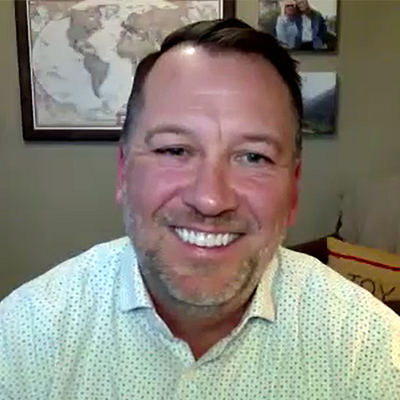
Aaron Shilts
Cybersecurity business leader Aaron Shilts discusses how he is leading his employees through the stresses and changes brought on by COVID-19, organic growth and a recent acquisition. He also shares three things your business should do if it hasn’t already done so to avoid a devastating cyberattack.
Shilts is president and COO of Minneapolis-based NetSPI, the industry leader in enterprise security testing and vulnerability management. NetSPI works with eight of the top 10 U.S. banks, three of the world’s five largest health care companies and the largest cloud providers. In December, it acquired Utah-based Silent Break Security to create a complete package for offensive cyber security and attack surface management.
Other chapters to this video interview (allowing one to jump right to them) include:
- How COVID-19 affected NetSPI's workforce in 2020
- Nothing connected to the Internet is safe, so what can you do?
- How much cyber security can affect mergers and acquisitions
- What Shilts anticipates his greatest challenge will be in 2021
- The upsides of working through a pandemic
Watch the video here via YouTube.
To listen instead of watching, download this interview or stream it on your device via Apple Podcasts, Spotify or other audio channels including Google Podcasts, Pocket Casts and Anchor.
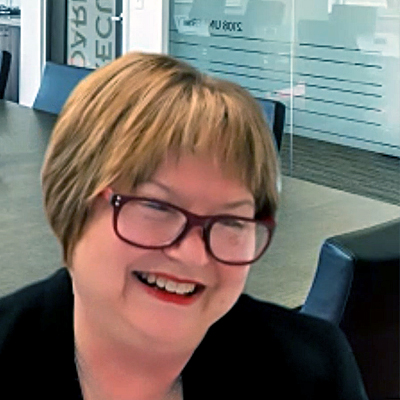
Kari Rihm
In this 20th episode of One Take CEO Interviews, Kari Rihm, owner, president and CEO of South St. Paul-based Rihm Family Companies (RFC), discusses what it’s been like this year leading her fourth-generation family-owned business that employs more than 350 people in 21 locations. RFC is comprised of Rihm Kenworth, the world’s second oldest continuously operated Rihm Kenworth truck dealership, and three related businesses providing genuine and aftermarket truck parts and accessories, truck rental and leasing, and international truck and parts sales and service training.
One take away regarding Covid-19’s pressure on her business: “When the pressure's on the pipes you find out where the leaks are,” she says. Rapid shifts in market demand compared with initial expectations about the pandemic’s impact on her industry led Rihm and her leadership team to look at processes more quickly, ask whether they were “leaking” and if so, how to fix them. “The other thing was finding out really who you can depend on in terms of your external resources.”
George Floyd’s murder by Minneapolis police officers, and the elevated awareness of racial discrimination that still exists in Minnesota, also affected Rihm.
“I thought that I lived in a state that was very welcoming and that that enjoyed its immigrant communities [truck drivers in this region have become much more diverse in the last 10 years]. And when I heard that Minnesota is one of the most racist states in the nation, I was shocked and I thought, ‘what do I believe?’ It caused some soul searching but also some researching as to why people are saying that the state is so discriminatory. I learned more about what institutional racism means and how it's been employed in our state, and it's shocking. I have been very open with our employees after that happened, asking them also to do some soul searching themselves, and I hope that they have.”
Rihm is optimistic that 2021 will be a good year for the industry and her business. But she remains concerned about Covid-19 and how people’s individual beliefs can hurt her business, not to mention other people. The biggest challenge is, “still needing to constantly communicate what the symptoms are and when you should stay home,” instead of coming to work and possibly giving the virus to others.
“The other part is caring about the people you don’t know. You know you should maybe care about who you work next to and your family, but I think it’s hard for people to think about caring about somebody who lives across town, or is just passing through, such as our transient truck drivers who could catch the virus here and take it to another community,” she says. “So, it’s tough. Our society has been a “me society” for so long it’s all about me. Well, I think we’re finding out it’s not all about me, it’s all about us.”
Watch this interview on YouTube or listen via Spotify or Apple Podcasts.
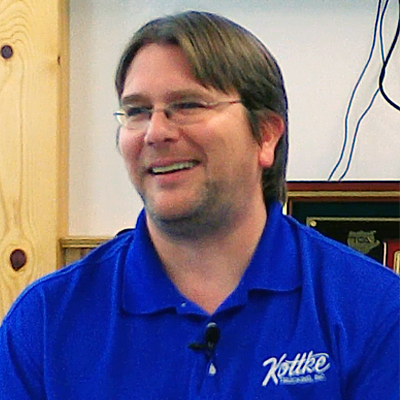
Kyle Kottke
Kottke Trucking Co. Co-Owner and CEO Kyle Kottke shares how his Buffalo Lake, MN-based trucking business has adapted in many ways since Covid-19 began to affect the economy back in March. This includes helping truckers find places to stop for gas and to stay overnight, when most locations shut down during the late spring months; and quickly adapting to a major drop in long-term business and demand for new spot-contract service, to then moving back toward long-term.
The company handled all of this by being, “incredibly transparent with everybody in the network,” Kottke says. “I had to tell them the struggles we're having, what’s going on with what you’re missing and why things are happening, and what we’re looking at. We’ve always run with an open book and thank goodness our customers know they can ask us any questions about how we do things at any time.”
Kottke Trucking is a third-generation family business with about 260 employees and operations in Minnesota and Florida.
Watch this interview on YouTube or listen via Spotify or Apple Podcasts.

Jill Blashak Strahan
During this week’s One Take CEO Interview, Tastefully Simple Founder and CEO Jill Blashak Strahan discusses what it was like to grow her 1995 startup into a $143 million-a-year business, and then lead through seven consecutive years of losses before Covid-19 hit. Ironically those recent tough times forced her organization to return to being scrappy like it was as a startup: lean, creative and agile – must-have traits for most businesses looking to grow this year.
“We ran though about $32 million in reserves... My turnaround advisors said, ‘too bad you had reserves because you know, you might have done something sooner [to turn things around]’,” she says. At the time, Blashak Strahan was doing everything possible to improve the business – including investing another $5 million into it with a line of credit. But in hindsight, matters she wishes she would have addressed sooner include recognizing the company had become too top-heavy (of 350 employees, about 50 were in leadership), and that she as a leader had stopped focusing on what she’s best at – building and creating. Also, headcount reductions – as painful as they are – needed to happen faster, as did initiation of a new discipline of always asking why a new hire is really needed.
Based in Alexandria, Minn., Tastefully Simple taps thousands of independent consultants across the United States to sell its made-in-the-USA seasonings, sauces, baking mixes, meal and entertainment kits and gifts through home tastings, online parties, catalog sales and website.
Watch this interview on YouTube or listen via Spotify or Apple Podcasts.
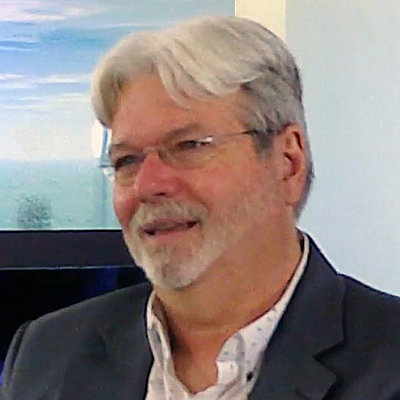
Bob Schafer
Founder and CEO Bob Schafer created a highly successful bakery supply business from scratch all from operating cash flow; no debt. Mixing and/or distributing 150 million pounds a year of ingredients to food manufacturers, this Minnesota Family Business Award-winning company has weathered three recessions since its founding in 1991. Thus far it is handling the Covid-19 recession well by adapting to the times, while also protecting its values. This includes how it pivoted to handle new business without hiring more people.
Northern Ingredients has picked up additional business from commercial bakeries that used to be able to buy direct from producers. Knowing this influx of orders will likely fade when Covid-19 does, Schafer asked his employees to work extra hours rather than hire more people. And he refused to add a third shift, placing workplace culture and personal life priorities before revenue growth. “We put out a schedule of voluntary 60 hours a week. We just said, ‘We’re going to 11 hours a day Monday through Friday, and five hours on Saturday. If it works for you, sign up. If we don’t get enough people to sign up then and only then will we add to our staff.’ Of our 16 production workers on any given day we have 14 there. The first two weeks it was 100 percent. We’re still operating only 50 hours but we’re doing the same production.”
Schafer discusses this and more in this interview, shot on location at Northern Ingredients in Arden Hills, MN. He talks about how to attract and retain talent beyond wage increases (which the competition can simply match) and provides tips for struggling business on how to survive this recession. These include working out creative terms with vendors and taking an honest look at parts of your business that could be eliminated, allowing you to focus on those most valuable.
You can watch this interview on YouTube or listen to it via Spotify.
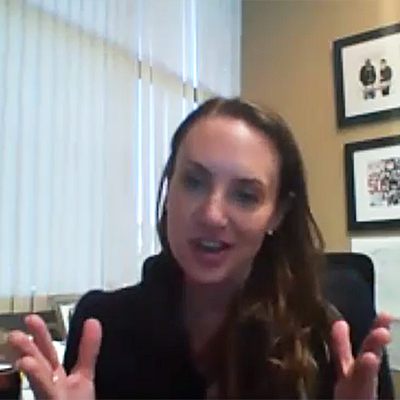
Aleesha Webb
This week’s One Take CEO Interview is with Aleesha Webb, vice chair and president of Blaine, MN-based Village Bank. Her second-generation family owned community bank has 69 employees, about $390 million in assets under management and offices in Blaine, East Bethel, Ramsey and St. Francis, MN.
Webb advises business owners to take advantage of low interest rates if they haven’t done so already, and to be strategic while thinking outside the box. Amongst her clients, “there’s this 70-plus year old man that's been in investment real estate forever and this budding entrepreneur a woman that decided to be an entrepreneur in her 50s, and... [with Covid-19’s impact on the economy], “they flipped the situation and said, ‘how am I going to take on this opportunity.’ These two are really nice examples of what people are doing and to what I mean when I say there’s a silver lining to everything.” [She explains more about each during the interview.]
Among other topics, Webb also discusses the importance of allowing oneself to feel stressed when something adversely affects employees and there’s no readily apparent solution. “The things that stress me out are never the things that most people think would stress me out. I actually have appreciated the time where I can’t go anywhere because I get to be with my children and my husband,” she says. “When I see our retail team struggling with having to be at the bank after one of our employees had Covid-19, and how worried they are about their families, that was the part that was hard for me. It’s the soft side of business, the soft side of culture, that if you lose, if it doesn’t shake you a little, you’re not a good president. You need to be shaken, and sometimes you need to not be able to fix things and really care.”
Join the conversation by either watching it on YouTube or listening through Spotify and Apple Podcasts.
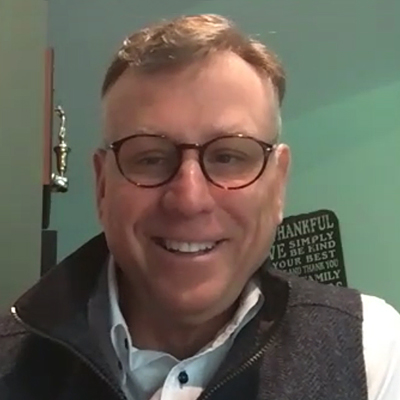
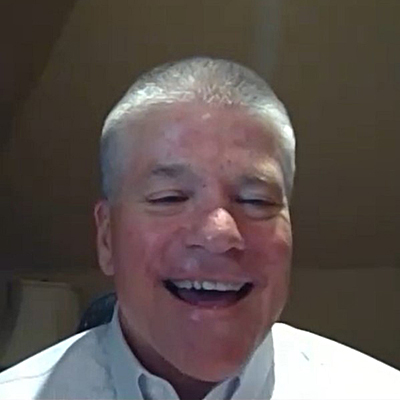
Jeff Kiesel
In this episode, learn how a business prepared for and then adjusted to a drop in business due to Covid-19 shutdowns. Mendota Heights, MN-based company is the nation's most efficient fry-oil business, providing everything from fresh oil appropriate for what's being fried, to equipment in the kitchen that dispenses new oil and then collects used oil. Watch or Listen to Restaurant Technologies Chief Jeff Kiesel.
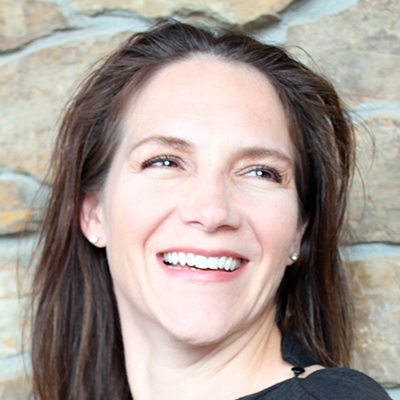
Christine Lantinen
In this week’s unedited One Take interview, Christine Lantinen talks about leading through the Covid-19 economy, how she and her team have changed marketing tactics, production processes and more, plus their need to hire more than 100 hourly employees and her thoughts on how business leaders can best deal with the stress created by these unsettling times. Watch or Listen to Maud Borup's Christine Lantinen.
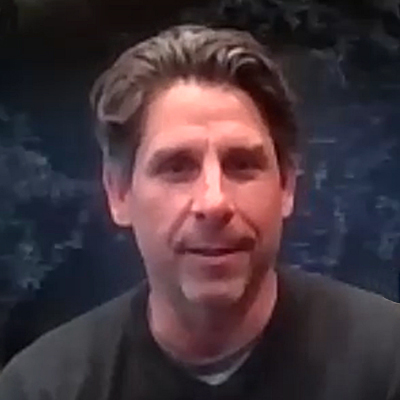
Chuck Runyon
Chuck Runyon discusses what his team has done to help 5,000 franchise owners deal with everything from negotiating rent deferrals and abatements to reopening safely. He talks about the value of culture and decentralized decision making. And he talks about the future for the world’s all time fastest growing franchise company, as ranked by Inc. magazine. Watch or Listen to Chuck Runyon, co-founder and CEO of Self Esteem Brands.
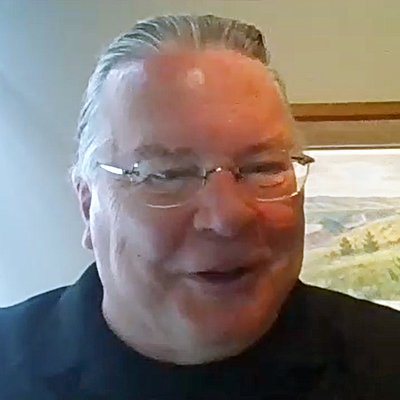
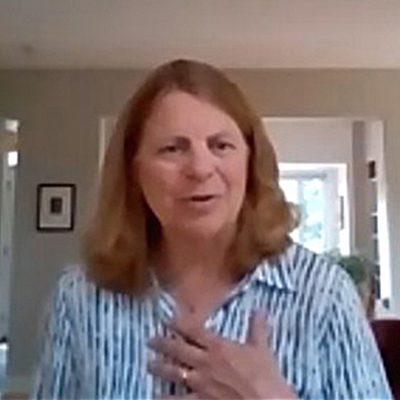
Penny Wheeler
During this week’s One Take CEO Interview, Allina Health President and CEO discusses how she’s leading the $4.4 billion health care provider during Covid-19 as well as how it survived fires and looting that damaged or destroyed most neighboring properties. Watch or Listen to Allina Health's Penny Wheeler.
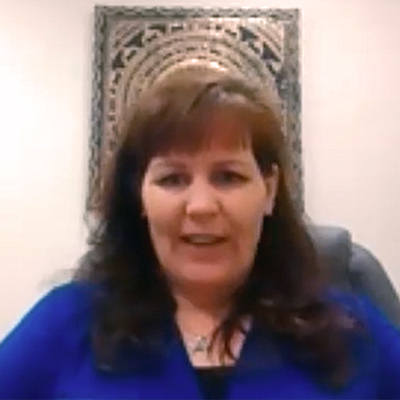
Stacy Demskie
Despite losing a significant amount of revenue from Covid-19 related restaurant closures, Mainstreet Bakery is doing relatively well financially. A key reason for this is its COO’s perspective on how to lead during these incredibly uncertain and surprising times. Watch or Listen to Mainstreet Bakery’s Stacy Demskie.
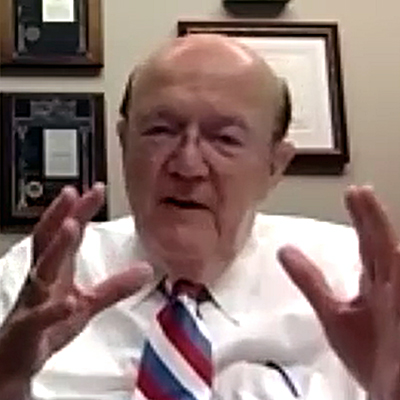
Manny Villafana
In this week’s episode, medtech serial entrepreneur Manny Villafana discusses the challenges of fundraising and leading during the Coronavirus recession, and shares how he’s moving ahead with his latest venture, Medical 21. Watch or Listen to Villafana’s interview. Also, see this “after the interview” two-minute demonstration of how he and his colleagues created the modern pacemaker.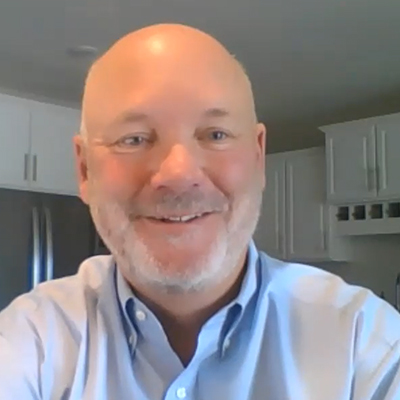
Eric Gibson
In this week’s episode, Indigo Signworks CEO shares how his company plans not just to survive, but grow in coming months by targeting a different type of client.He also discusses how he’s keeping 145 employees at seven locations in two states motivated despite the pressures and uncertainties caused by the Covid-19 pandemic and recession. Watch or Listen to Eric Gibson’s interview.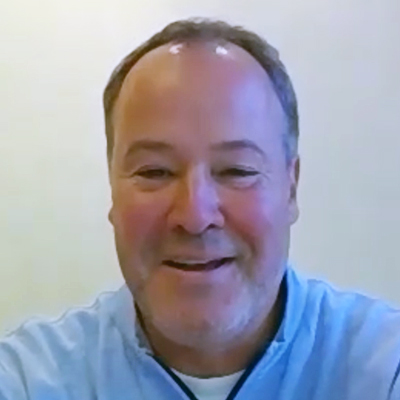
Chad Nesbit
Covid-19 has created what can seem like two worlds; those who are extremely concerned about catching Covid-19 and those who don't understand why businesses and other aspects of "normal life" aren't more open. In this week’s segment of One Take CEO Interviews, Chad Nesbit of the business insurance firm Nesbit Agencies shares how his firm and some of his clients are dealing with this dilemma. Tune in to this discussion by watching here or by listening via Spotify or Apple Podcast.

Bobby Tarnowski
Covid-19 related restrictions are forcing many businesses owners to contemplate raising prices, yet doing so can hurt business. Better options, says Bobby Tarnowski, are to create new types of product or service offerings, provide financing to those who cannot afford to pay for things outright, and try new and unique ways of marketing. Such constructive problem solving makes sense given he's a math enthusiast who owns a 10-location, 65-employee Mathnasium franchise in the Twin Cities. Watch or Listen as Tarnowski shares these ideas and more during this week's One Take CEO Interviews.
